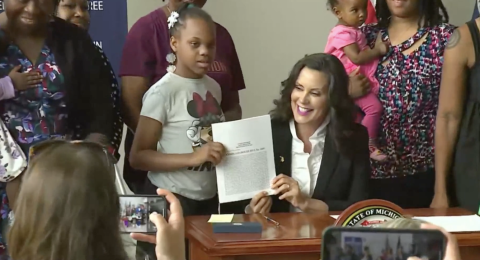All told, Michigan is putting $598 million toward reimbursing groups that participate in the state retirement system, which also includes libraries and community colleges. Local school districts are expected to receive roughly $500 million more combined, according to the Senate analysis.
But because those required contributions depend on a district’s payroll, districts with higher payrolls relative to student enrollment will get a larger per-pupil bump, said Craig Thiel, an education finance expert with the nonpartisan Citizens Research Council of Michigan, in a blog post analyzing the budget deal.
Whitmer has framed the deal as the equivalent of an average increase of $400 per student. And a spokesperson for House Speaker Joe Tate said it will provide a “funding increase for Michigan schools across the board.”
But “it’s disingenuous” to say the funding is equivalent to a foundation allowance increase, “because it’s not,” Thiel told Bridge.
No foundation allowance increase
In signing the $23.4 billion education budget Tuesday in Flint, Whitmer said it “continues an all-time high” per-pupil funding level. But pointing to the district-by-district variance, some school leaders have questioned the fairness of the new state spending plan.
Michigan school groups had advocated for a reduction in required retirement fund contributions, but superintendents told Bridge they are worried the deal does not include the level of certainty as a foundation allowance increase.
Last year’s budget boosted the foundation allowance by $458 per student in every school across the state, save for virtual charter schools, to $9,608. For this year, Whitmer had initially proposed another $241 bump, while the House had proposed $217 and the Senate had proposed $302.
But the final deal dropped any foundation allowance increase in favor of refunds for a portion of what traditional public school districts are obligated to pay into the state retirement system.
Charter schools, which largely do not participate in the state retirement system, will receive a 3.9% increase to their foundation allowance, which amounts to a $375 per student bump.
All schools are expected to see a bump of some kind, but the new budget “creates these huge swings in the amount of funding,” Thiel said.
Michigan lawmakers in recent years closed a longstanding gap in funding per district. But the new budget, Thiel said, amounts to “taking a step backwards” in terms of equally funding districts.
Some Democrats who voted for the budget last month later alleged they were misled by leadership because a separate bill that would have made the retirement savings permanent was not finalized or sent to the governor for signature.
The nonpartisan House Fiscal Agency describes the funding as “ongoing,” but local school leaders who spoke with Bridge said that without additional legislation, they are concerned the new funding may disappear in subsequent budget years, making it hard for them to plan for the future.
Morrice Area Schools, which is set to receive the equivalent of an additional $382 per pupil in the new budget, is in a good spot financially for the upcoming school year, Superintendent Robert Pouch told Bridge.
But with new contract negotiations set to begin with the teachers union this winter, a “one-time payment” from the state makes it difficult to “increase salaries when there’s not a guarantee I’ll have that money the following year,” he said.
Looking forward
State Rep. Angela Witwer, a Delta Township Democrat who chairs the House Appropriations Committee, told Crain’s Detroit lawmakers have “no intention” of lowering their financial commitments to school districts in future years.
House Speaker Joe Tate’s office also defended the new budget.
“The fact the required contributions to retirement costs are based on a percentage of payroll creates a disincentive for districts to hire teachers as it grows payroll and increases costs, directing dollars away from the classroom and to retirement benefits costs that are already adequately funded,” Tate spokesperson Amber McCann told Bridge.
She noted the budget also includes new spending on special education, at-risk services, and out of school programming.
But Grant Hegenauer, superintendent of Frankenmuth School District, told Bridge that the funding mechanism in the new budget is “not a fair and equitable way to distribute or recapture money.”
His district is poised to receive an increase of $323 more per student, according to the Senate analysis, which is less than the $400 average increase Whitmer has touted.














